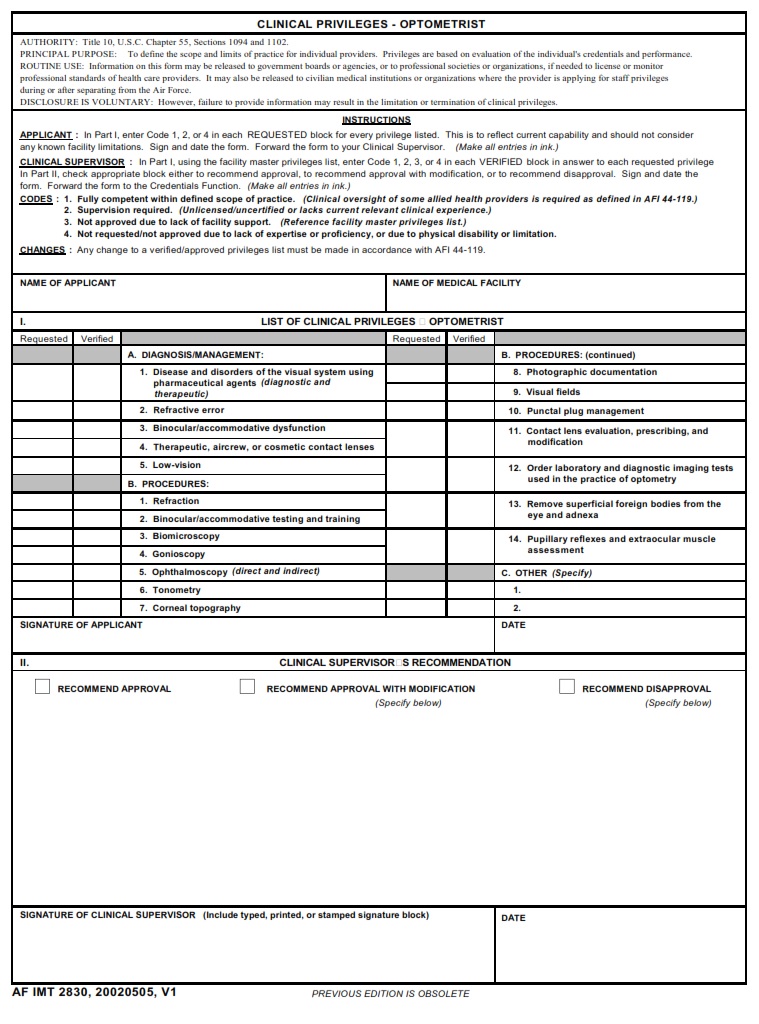AF-FORMS.COM – AF Form 2830 – Clinical Privileges – Optometrist – Are you ready to see the world through a new lens? Well, get ready because we’re about to take you on a journey into the fascinating world of optometry. In this article, we’ll be exploring the AF Form 2830 – Clinical Privileges for Optometrists in the Air Force. This form is your ticket to unlocking the full potential of your optical expertise and providing top-notch eye care for our brave servicemen and women. So buckle up and get ready to dive into the exciting realm of military optometry.
Picture this: You’re sitting in a small, dimly lit room, staring at an eye chart while someone adjusts lenses in front of your face. It’s a familiar scene that most people associate with routine visits to their local optometrist’s office. But what if I told you that there’s a whole other side to optometry? A side where your skills can make a real difference in people’s lives – especially those who serve our country in the Air Force. In this article, we’ll be delving into the AF Form 2830 – Clinical Privileges for Optometrists, which opens doors to an exciting career path that combines both medicine and military service. Get ready to discover how you can turn your passion for eyesight into an opportunity to support our nation’s defenders.
Download AF Form 2830 – Clinical Privileges – Optometrist
| Form Number | AF Form 2830 |
| Form Title | Clinical Privileges – Optometrist |
| Edition Date | 5/5/2002 |
| File Size | 135 KB |
AF-Form-2830-Clinical-Privileges-Optometrist.pdf (37 downloads )
What is an AF Form 2830?
An AF Form 2830 is a critical document related to clinical privileges for optometrists in the Air Force. The form serves as a formal request and evaluation tool that allows optometrists to apply for specific clinical privileges within their scope of practice. It provides the necessary information to review boards regarding an optometrist’s education, training, experience, and competencies.
This form plays a vital role in ensuring that healthcare providers possess the necessary qualifications and skills to perform specific procedures or practices. It helps identify if there are any limitations or restrictions on an optometrist’s scope of practice, allowing for proper patient care management and safety. By carefully evaluating an optometrist’s application through this form, military medical facilities can ensure quality healthcare delivery while maintaining high standards of care.
Completing an AF Form 2830 requires thorough documentation and evidence of one’s education, certifications, training programs attended, licenses held, and relevant legislation compliance knowledge. All this information must be provided truthfully and accurately testament to the importance placed on patient safety and well-being within the military healthcare system.
In summary, the AF Form 2830 is not just another bureaucratic requirement; it is a valuable tool in assessing an optometrist’s qualifications and competencies. By providing complete and accurate information on this form, optometrists can demonstrate their abilities while military medical facilities can uphold high standards of care.
Where Can I Find an AF Form 2830?
If you’re an optometrist in the United States Air Force and need to obtain clinical privileges, you may be wondering where to find an AF Form 2830. This form is vital for documenting your training and experience, ensuring that you meet the necessary qualifications to provide eye care services to military personnel and their families. While it may seem like a daunting task to track down this particular form, there are a few avenues you can explore.
Firstly, start by checking with your local medical facility’s administrative office. They should have copies of all required forms, including the AF Form 2830. If they don’t have a physical copy available, they may be able to direct you to an online repository where you can download and print the form yourself.
Another option is reaching out to professional organizations or societies that cater specifically to optometrists in the military. These groups often provide resources and support for those seeking clinical privileges within military healthcare settings. Contacting them directly can not only help you locate the AF Form 2830 but also connect you with valuable insights from other optometrists who have gone through this process.
In conclusion, tracking down an AF Form 2830 for optometrists seeking clinical privileges is achievable with some resourcefulness and persistence. Start by contacting your local medical facility’s administrative office or reach out to professional organizations specializing in military optometry. Armed with these resources, you’ll soon have access to the necessary paperwork for documenting your qualifications as an essential part of providing top-notch eye
AF Form 2830 – Clinical Privileges – Optometrist
AF Form 2830 is a crucial document that determines the clinical privileges granted to optometrists in the United States Air Force. It serves as a platform to assess an optometrist’s skills, knowledge, and experience before granting them specific professional privileges within the military health system. This form plays a pivotal role in ensuring that optometrists are able to provide safe and effective care to their patients.
The thorough evaluation conducted through AF Form 2830 guarantees that only qualified professionals with proven expertise are given clinical privileges. The document covers various aspects of an optometrist’s training, including education, board certifications, and prior experience in both civilian and military healthcare settings. By reviewing this information, the medical authorities can determine whether the individual possesses the necessary skills and qualifications required for specific clinical tasks.
Form 2830 not only benefits military personnel but also enhances patient safety within military healthcare facilities. By conducting stringent evaluations and background checks on optometrists seeking clinical privileges, potential risks associated with inadequate training or proficiency can be minimized. Ultimately, this ensures high-quality eye care for service members and their families who rely on trusted optometric professionals within the military health system.
